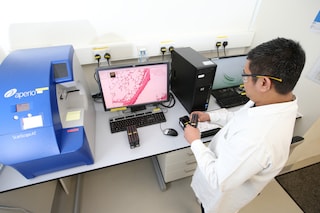A new study has found using e-cigarettes induced significantly lower biological responses associated with heart and lung diseases than cigarette smoke. Scientists evaluated the impact of e-cigarette vapor, both with and without nicotine, over a period
of six month in a mouse model. The effects of e-cigarette vapor were compared with exposure to conventional cigarette smoke in a research collaboration project between PMI and Altria Group Inc.
E-cigarettes are gaining popularity as a potential alternative to cigarettes. In contrast with cigarettes, e-cigarettes deliver nicotine without many of the toxicants in cigarette smoke. Currently, there is limited data on the long-term effects of nicotine-containing
e-cigarette vapor in terms of toxicology or disease risk assessment compared with that of cigarette smoke.
This study in mice compared the effects on the heart, lungs, and major arteries that were exposed to e-cigarettes, cigarettes, and fresh air. After six months of scheduled exposures (3 hours day, 5 days a week), the results showed that e-cigarettes vapor:
- Resulted in lower levels of the markers of lung inflammation, structural damage, and molecular changes compared with cigarette smoke.
- Lead to reduced plaque formation in the arteries and reduced molecular changes in the aorta and heart tissues compared with cigarette smoke.
- Did have some expected nicotine-related effects on the arteries, but the effect was smaller than observed with cigarette smoke.
- Showed reduced effects on artery function and heart function compared with cigarette smoke.
These results are a powerful addition to the evidence showing that switching to e-cigarettes is a much better choice than continuing to smoke
“These results are a powerful addition to the evidence showing that switching to e-cigarettes is a much better choice than continuing to smoke,” said Dr. Julia Hoeng, PMI’s Director of Systems Toxicology. “This study truly is a
landmark study, not just demonstrating the reduced toxicity and disease risk between e-cigarettes and cigarettes but also evaluating the role of nicotine and flavors.”
Justyna Szostak, presented this study today at the Society of Toxicity 58th Annual Meeting & ToxExpo, and the full results of this study will be submitted for publication in a peer-reviewed journal.
Recent studies elsewhere have presented contradictory findings, many of them based on analyses of data from the National health Interview Survey. These studies and news coverage of them tend to focus largely on correlations, such as between e-cigarettes and incidence of heart attack. However, those correlations are reported without regard to when the heart attack happened, which may even have been before the person switched from smoking to vaping. Mistakes like these play a major role in discouraging adult smokers from switching to products that are better for them than smoking.








